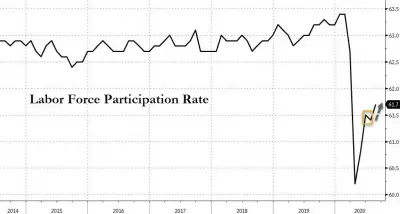Hay varias
Unemployment
How to Measure Unemployment
In the United States, the government uses surveys, census counts, and the number of
unemployment insurance claims to track unemployment.1
The U.S. Census conducts a monthly survey on behalf of the
Bureau of Labor Statistics (BLS) called the
Current Population Survey (CPS) in order to produce the primary estimate of the nation’s unemployment rate. This survey has been done every month since 1940. The sample consists of about 60,000 eligible households, translating to about 110,000 people each month. The survey changes one-fourth of the households each month in the sample so that no household is represented for more than four consecutive months in order to strengthen the reliability of the estimates.1
Many variations of the
unemployment rate exist with different definitions concerning who is an "unemployed person" and who is in the "labor force." The BLS commonly cites the "U-3" unemployment rate—defined as the total unemployed as a percentage of the civilian labor force—as the official unemployment rate. However, this definition of unemployment does not include unemployed workers who have become discouraged by a tough labor market and are no longer looking for work. Other categories of unemployment include discouraged workers and part-time or underemployed workers who want to work full-time but, for economic reasons, are unable to do so.
Unemployment Rate Definition
What Is the Unemployment Rate?
The unemployment rate is the percent of the labor force that is jobless. It is a
lagging indicator, meaning that it generally rises or falls in the wake of changing economic conditions, rather than anticipating them. When the economy is in poor shape and jobs are scarce, the unemployment rate can be expected to rise. When the economy is growing at a healthy rate and jobs are relatively plentiful, it can be expected to fall.
In the U.S., the U-3 rate, which the
Bureau of Labor Statistics (BLS) releases as part of its monthly employment situation report, is the most commonly cited national rate. It is not the only metric available, and measures unemployment fairly narrowly. The more comprehensive
U-6 rate is an alternative measure of unemployment that includes groups such as discouraged workers, who have stopped looking for a new job, and the underemployed, who are working part time because they can't find full time work.1
Basicamente en USA hay 6 medidas del paro, teniendo en cuenta quien consideran "en busqueda activa de empleo"


